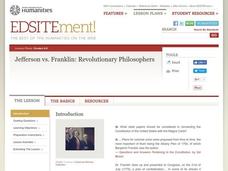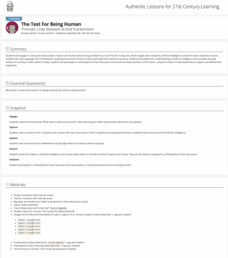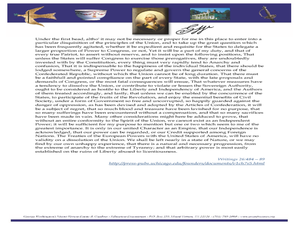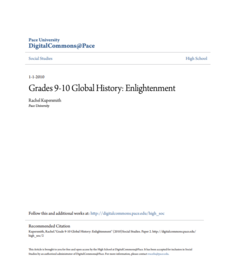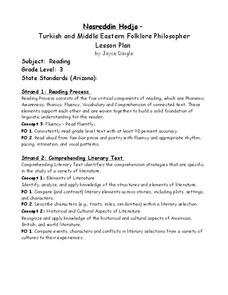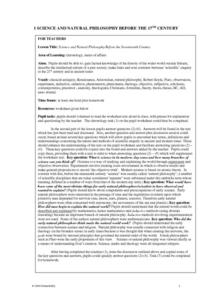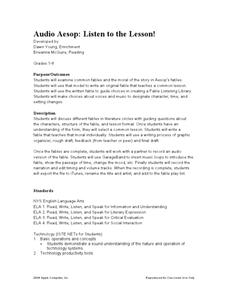National Woman's History Museum
Feminist Philosophers of the 20th Century
Reclaim forgotten philosophers of the twentieth century. Feminist philosophers have shaped our current concepts of politics and gender, but they are seldom mentioned in the classroom. Change that omission with a lesson plan that includes...
Curated OER
Jefferson vs. Franklin: Revolutionary Philosophers
Middle schoolers cite connections among Franklin's Albany Plan of 1754, his Plan of Confederation of 1775 and the U.S. Constitution and/or the Declaration of Independence. In an essay, they give examples of the philosophical and...
Encyclopedia Britannica
Electoral College Philosophical Chairs Debate
Because of the Electoral College, it is possible to win the popular vote in a US Presidential election and still lose the election. After researching the pros and cons of the Electoral College, class members engage in a structured debate...
PBS
Henry David Thoreau: Author, Philosopher, and Abolitionist
What would Henry David Thoreau think of life in 21st-Century America? Pupils investigate the abolitionist using primary and secondary materials. They analyze what Thoreau would think of the changes to American lifestyles since the time...
Curated OER
Ancient Greek Philosophers:Socrates, Plato, and Aristotle
Pupils discover the famous Greek Philosophers. In this Greek lesson, students find the contributions of Ancient Greece and their philosophers. This lesson includes brief bios on Socrates, Plato, and Aristotle
K20 LEARN
The Test for Being Human: Thematic Links Between AI and Frankenstein
"It's alive!" Or is it? Scholars tackle the question of what it means to be human in a lesson that asks them to research the Turning Test and other devices that attempt to prove whether AI devices can pass as humans. After participants...
Curated OER
George Washington & the Classics
Students will compare and contrast famous philosophers with George Washington. In this history lesson, students work in small groups to define Classicism, Legalism, Democracy, Republic and Civility, then read some short excerpts so that...
Curated OER
The Making of the Mahatma: Gandhi's Childhood
Learners investigate the childhood of one of the greatest philosophers of our time, Gandhi. In this biography activity, students analyze the upbringing and events that finally shaped Mahatma Gandhi's life. Learners locate famous quotes...
K20 LEARN
Ancient Philosophy: Greeks or Romans?
While often not recognized, the ideas of ancient Greek and Roman philosophers still echo today. Using a series of videos and graphic organizers, individuals explore how ancient Greeks and Romans have influenced current Western political...
Curated OER
How Man Negotiates Away His Natural Freedom
Students recognize that our legal-political system hasdeveloped through a process of moving from philosophical ideals to compromised working models. They apply John Locke's views to the development of U.S. political theory and systems.
Curated OER
Jefferson vs. Franklin: Revolutionary Philosophers
Students examine the contributions of Benjamin Franklin and Thomas Jefferson to American Independence. In small groups, they conduct Internet research, read and discuss primary source documents, and complete a chart.
Pace University
Global History: Enlightenment
The core ideas of the Enlightenment—reason, knowledge, and freedom—represented a rebellion against the despotic control of absolute monarchs. As part of the study of the movement, class members assume the voice or either a monarch or an...
Curated OER
Physicists or Philosophers?
Trace the sequential process of the developing theories of atomic structure in the early 20th century, show, in historical development, how scientists "know" things, how experiments are set up and how interpretations are drawn from them,...
Curated OER
Nasreddin Hodja - Turkish and Middle Eastern Folklore Philosopher
Third graders read a readers theater written by Nasreddin Hodja. In this Nasreddin Hodja lesson plan, 3rd graders learn about the philosopher and participate in one of his reader's theaters.
Curated OER
Four Enlightenment Thinkers
Students examine lives, philosophies, and political beliefs of four Enlightenment Thinkers: Baron de Montesquieu, Jean-Jacques Rousseau, Thomas Hobbes, and John Locke. Students then work with partner to write short speech from...
Curated OER
Science and Natural Philosophy Before the Seventeenth Century
Students complete a worksheet about some of the natural philosophers in history. They use graph paper and create a timeline with the dates of birth and names of a list of natural philosophers. They list four questions concerning life and...
Curated OER
Should Art Be for Art's Sake?
Young scholars examine how European-America aestheticians (philosophers of art) do not all agree about the value and definition of art. students examine how some cultures do not have a distinct word or definition for art.
Teaching Children Philosophy
Tiger-Tiger, is it True?
Scholars take part in a philosophical discussion about truth, thoughts, and feelings following a reading of Tiger-Tiger is it True? by Byron Katie and Hans Wilhelm.
Curated OER
iQuote Project
Students create a platform in which they share quotations of well known philosophers. They discuss their own views and ideas about the different quotations.
Curated OER
Argument in an Athenian Jail: Socrates and the Law
Young scholars read and discuss Socrates's "Crito" and examine the arguments he made supporting his own death penalty. They consider the still-relevant debate between the rights of the individual and the rule of law.
Benjamin Franklin Tercentenary
Ingenious: Franklin Assembles a Scientific Community
Few Americans have heard of the burgeoning scientific community known as the America Philosophical society, started by none other than Benjamin Franklin. With inquiry, research, and discussion, high schoolers come to understand their...
Curated OER
Audio Aesop: Listen to the Lesson!
Aesop's Fables are the focus of this language arts lesson. Young philosophers study and discuss the morals found in the most famous of Aesop's Fables. They write an original fable that teaches a common moral. A "Fable Listening Library"...
Curated OER
Leaders, Laborers, and Other Perspectives of World War II
How did the women in France feel about their country’s involvement in World War II? Class groups are assigned a country involved in WWII, and individuals within the group adopt the point of view of leaders, laborers, businessmen, women,...
Curated OER
Ohm's Law: Getting There Hands On
Young scientists inductively derive Ohm's Law of voltage, resistance, and current by creating series and parallel circuits with 9-volt batteries and light bulbs. A week's worth of experiments, observation, and hands-on activities are...
Other popular searches
- Ancient Greek Philosophers
- Greek Philosophers
- Enlightenment Philosophers
- The Philosophers
- Ancient Greece Philosophers
- Ancient Philosophers
- Philosophers in Education
- Political Philosophers
- Philosophers of Education
- Great Philosophers
- Renaissance and Philosophers
- Ancient Chinese Philosophers



